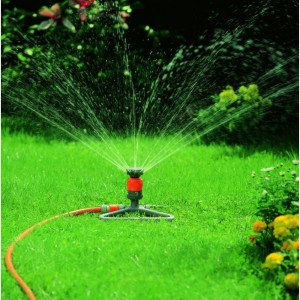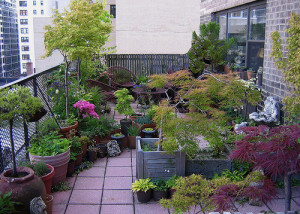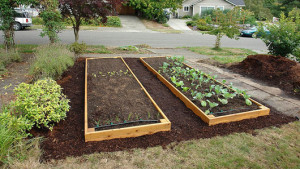Clean air is mandatory for a healthy lifestyle, but how can one expect the atmosphere to be pollution free in today’s era, especially those people who live in the big metropolitian cities, and those who live around industrial areas! A great and indulgive activity is a possible solution to this problem – gardening!
When one thinks about gardening, the first thing that comes to the mind is a big open patch of land, fertilizers, pesticides, seedlings, water arrangements, etc. which are enough to convince us that maintaining a garden is a mammoth task. Most of us submit ourselves to this conclusion, but what we do not think about is the benefits of having a green zone around our home.
It is not a compulsion to have a big garden, even a small square patch of two metres can be enough to begin with. People who live in bungalows can spare some space for a green space, but nowadays, majority of the urban population resides in multi – storeyed buildngs, where maintaining a garden in not evitable. But people can still put small plants in their balconies, and contribute towards a healthier environment.

Maintaining a Garden
People living in multi – storeyed buildings often a have central society body. Residents of these societies can ask their society developers to create a small garden in the building’s compound, and the residents can take up initiative of maintaining that garden. We can also buy small plants for our balconies, and keep them in small pots. A collection of such small plants will give the effect of small garden in our home! Its not too easy to maintain garden, neither it is too difficult. It requires the proper maintenance to be in a good health.

- To begin with, a healthy compost is required for the soil. Going for a chemical fertilizer will be like killing the purpose of bringing up a garden. For a healthy compost, we can collect dry leaves and twigs, and also include the vegetable peels and fruit peels, which otherwise would have been dumped in the garbage bags. These components must be mixed and kept together for some days to dry in the sunlight. After it is dried, it must be crushed to powder form, and should be mixed thoroughly with the soil.
- Mulch is essential for retaining soil moisture and inhibiting weeds. Tree chippings are excellent natural mulching agents. We can also the local municipal authority to obtain composted waste, which again serves a good mulch.
- We can make our organic fertilizers. We can mix about half a Kg of Comfrey leaves in 10 litres of water, and allow it to stand for four to five weeks, after which the water can be directly fed to the plants. Same activity can be done with nettle feed. We can also add sheep or cow droppings, but some of us might feel “eeeww” about that, so its optional!
- Water must be provided frequently, but in little amount. Spraying should be done preferably in the morning, or in the evenings.
- Earwigs (a kind of pest) can be removed by an easy way, and this prevents the use of pesticides. One can place wet newspapers above the soil during the night. Next morning, during sunrise, the earwigs will get inside the wet newspaper to shelter themselves. This newspaper can be burned along with the bugs, or the bugs can be flushed after drying.
- Slugs, a common and wide threat to plants, are attracted by beer and caffeine. We can place beer in an empty can (filled one – third), and keep it in around the plants at night. The slugs will crawl in at night, and fall in the can and drown. Instead of beer, one can use strong coffee as well.
- Derris, a liquid substance derived from the roots of plants is very effective against blackfly,greenfly,aphids and flee beetles.
- Ladybirds and lacewings can be purposely put in the pots or the garden, as they eat the harmful aphids and other plant insects. But too much of ladybirds are not a good options, so a controlled number must be used.

Watch out for the following
- Fast growing plants can lead to a menace. Their roots can penetrate too deep in the soil, and if kept in pots, they can break free or die. Some can grow outwards, and spread too much. Such plants should be avoided or else they need frequent trimming. Some of these are mint, golden rod, daisies, etc.
- Pots should not be filled with pebbles. Pebbles take up the space which is essential for the expansion of roots, and also contribute to fungal growth.
- Do not pour water in excess, even if its summer season. Too much water can block oxygen supply to lower roots, and can lead to growth of moss and fungi.
- Excessive sunlight during summers can dry the plants. Pots can be kept away from sunlight during noon time, or they can be kept under shade.
- If a plant is affected by aphids, it must be isolated from other plants as aphids can travel to other plants, as they multiply fast!
Benefits of this indulging activity!
Gardening is an interesting activity, and has its benefits as well.
- Maintaining a green zone around your home will help purify the air around you, and you will have a healthier environment.Plants absorb the harmful gases from the environment, and give out oxygen during the daytime.
- Some plants also have medicinal properties, which can be grown at home easily. These plants can be directly used, like neem and tulsi leaves can be mixed in tea or hot water, and drinking it has been proved good for personal health. Aloe vera leaves when rubbed on the scalp, they help get rid of the dandruff.
- We can grow various flowers as well, which helps in making up a good landscape.


Leave a Reply